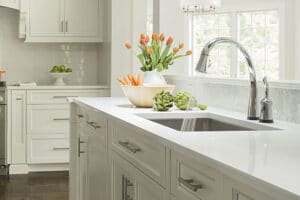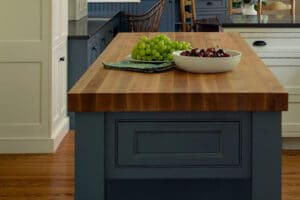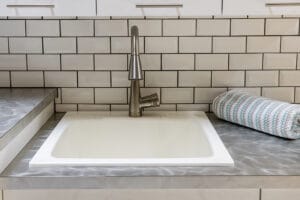When most folks think about kitchen countertops, they realized that they are surfaces mostly used for meal preparation. It is important to keep clean your stone kitchen counter, not only for aesthetics purposes but also for the health and safety of your family. They should also be cleansed to ensure that various dirt and stains are removed.
While there may be companies specialized in the nitty-gritty business of countertop cleaning, it is best to have a regular wipe-down ensuring that grease and stains won’t harm that pristine look. There are different ways of cleaning countertops depending on the type of materials used.
The Art of Cleaning Granite Countertops
Granite gives the elegance needed in the kitchen atmosphere, and it is one of the most common materials of choice even in modest households. Aside from being strong and durable, it also has an almost infinite variety of colors to choose from. However, this type of stone countertop has a sealant that requires maintenance every two to four years.
To clean granite, harsh chemicals, an abrasive cleaner or tools are a no-go! Although it is less porous than marble, it is important to note that oils and other liquids should be cleaned up immediately. To remove stains, a baking soda paste can do the trick. There are available granite countertop cleaners on the market; however, a DIY or homemade granite cleaner can also suffice. Just mix a 50:50 ratio of rubbing alcohol and water, then add 20 drops of chosen essential oil. If you choose to go this route, you’ll be cleaning and freshening up the scents in your space!

Keeping Quartz Countertops Clean
Also known as engineered stone, a quartz countertop is usually made of around 93 percent quartz and 7 percent resin. Quartz countertops are versatile, easy to maintain, and may even be custom fabricated depending on the customers’ preferences. They are also immune to stains and can even resist heat and acid.
To remove tough stains from quartz countertops, isopropyl alcohol and glass cleaner can be used. Degreasers can also be used to remove oils and dried gunk. However, a mild dish soap, water, and the soft rag can maintain that luster and shine this stone boasts of.

Removing the Mess from Marble Countertops
Marble is one of the most luxurious materials used for kitchen countertops over the past decades. Aside from being waterproof and heatproof, each slab is also very unique and brings additional value to a home. However, maintaining this natural stone kitchen counter clean can be a bit of a higher-maintenance job that requires effort and attention. For organic food stains, a few drops of ammonia and 12% hydrogen peroxide will remove them. However, oil-based stains can only be removed by a gentle liquid cleanser containing detergent, acetone, or mineral spirits. To properly take care of marble, prevention is the best cure.
Keeping Things Crisp with Wood and Ceramics
A wood countertop, often referred to as butcher’s block countertops, are a very popular choice in restaurants. Aside from offering a warm look to the kitchen, it is also easy to clean and maintain. Stains can be removed by cleaning them with a damp cloth using lemon juice or vinegar (both are a natural acidic cleaner). Stubborn ones can be handled by a pH-neutral wood cleaner. Cleaning it regularly with dish soap, water, and a sponge can cleanse this butcher’s block.
Ceramics are also easy to sanitize and are less expensive than other stones to boot. It is immune to heat damage and can be customized according to the color and pattern desired. A commercially prepared tile detergent can ensure the cleanliness of the ceramic countertop. However, a DIY solution of liquid soap, cup water, 1 2/3 cup of baking soda, and two tablespoons of vinegar can remove the everyday accumulation of dirt.

Other Countertop Hygiene Suggestions
Other types of countertops such as laminate, concrete, and stainless steel can be cleaned with a microfiber cloth, hot water, and dishwashing liquids. Non-abrasive scrubbers and baking soda can also remove those heavier stains. A Soapstone countertop can be wiped with mineral oils, but scrubbing them with mineral cleaners can reduce their shine. Scrub brushes and scouring pads should be used with the utmost consideration. Harsh chemicals and acidic cleaners should be avoided.
To maintain the quality of various types of countertops, being careful about a stain from liquids and oils spilled can ensure their longevity. Deep cleaning counters with a soft cloth once in a while can also contribute to damage prevention and maintain quality and integrity.

The Cleaning Conclusion
Any solid surface countertop you choose will need to be cleaned on a regular basis. Some are more time-intensive and “sensitive” than others, but the best way to care for your clean countertops is to try and avoid disasters from the start. We know, it’s not always easy, but the nicer you are to your countertops, the longer you can enjoy them!
Want more information on which counter tops might be the best fit for you? Contact a member of the Metropolitan Design Team today to talk about your next stone surface project.